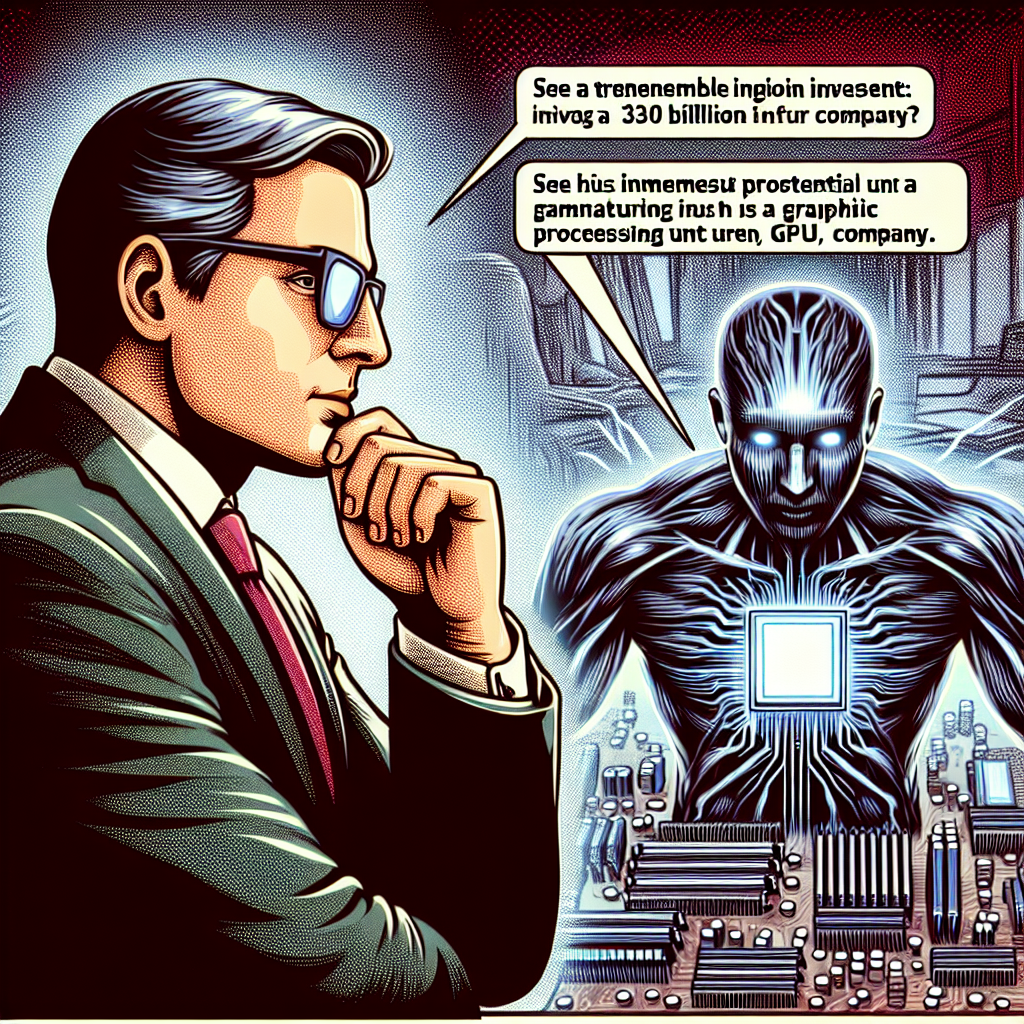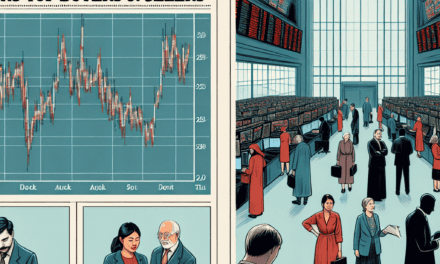“Masayoshi Son’s $130 Billion AI Vision: Unleashing Nvidia’s Untapped Potential”
Introduction
Masayoshi Son, the visionary founder and CEO of SoftBank Group, has long been known for his bold investment strategies and keen eye for transformative technologies. His latest venture, a staggering $130 billion bet on artificial intelligence, underscores his unwavering belief in the sector’s potential to reshape industries and redefine the future. Central to this ambitious investment is Nvidia, a leading player in the AI and semiconductor space. Despite its already substantial market valuation, Son perceives Nvidia as significantly undervalued, driven by its pioneering advancements in AI hardware and software, robust growth prospects, and strategic positioning in the burgeoning AI ecosystem. Son’s confidence in Nvidia reflects his broader conviction that AI will be the cornerstone of the next technological revolution, and he is positioning SoftBank to be at the forefront of this seismic shift.
Masayoshi Son’s Vision: The Future of AI and Nvidia’s Role
Masayoshi Son, the visionary founder and CEO of SoftBank Group, has long been known for his bold investments and forward-thinking strategies. His latest move, a staggering $130 billion bet on artificial intelligence (AI), underscores his unwavering belief in the transformative power of this technology. Central to this ambitious investment is Nvidia, a company that Son perceives as significantly undervalued despite its current market standing. To understand Son’s perspective, it is essential to delve into his vision for the future of AI and the pivotal role he envisions for Nvidia in this rapidly evolving landscape.
Son’s investment philosophy has always been rooted in identifying and nurturing technologies that promise to redefine industries. AI, with its potential to revolutionize sectors ranging from healthcare to transportation, aligns perfectly with this approach. Son’s conviction in AI’s future is not merely speculative; it is grounded in a comprehensive understanding of the technology’s capabilities and its trajectory. He foresees a world where AI is seamlessly integrated into everyday life, enhancing efficiency, productivity, and innovation. This vision is not just about technological advancement but also about creating a sustainable and prosperous future.
In this context, Nvidia emerges as a critical player. Known for its cutting-edge graphics processing units (GPUs), Nvidia has established itself as a leader in AI hardware. Its GPUs are integral to the development and deployment of AI applications, providing the computational power necessary for complex machine learning tasks. Son’s assessment of Nvidia as undervalued stems from his belief that the market has yet to fully appreciate the company’s potential in the AI domain. While Nvidia’s current valuation reflects its success in the gaming and data center markets, Son argues that its AI capabilities are poised to drive unprecedented growth.
Moreover, Son’s confidence in Nvidia is bolstered by the company’s strategic initiatives and innovations. Nvidia’s focus on AI-driven solutions, such as its AI-powered autonomous vehicle platform and its advancements in AI research, positions it at the forefront of the industry. These initiatives not only demonstrate Nvidia’s commitment to AI but also highlight its ability to adapt and thrive in a rapidly changing technological landscape. Son’s investment is thus a testament to his belief in Nvidia’s capacity to capitalize on the burgeoning AI market.
Furthermore, Son’s track record of successful investments lends credibility to his current strategy. His early investments in companies like Alibaba have yielded substantial returns, reinforcing his reputation as a shrewd investor with an eye for transformative technologies. By channeling significant resources into AI and Nvidia, Son is once again betting on a future that he believes will be shaped by technological innovation. His decision reflects a deep understanding of market dynamics and a willingness to embrace risk in pursuit of long-term gains.
In conclusion, Masayoshi Son’s $130 billion AI bet, with Nvidia at its core, is a bold affirmation of his vision for the future. By recognizing Nvidia as undervalued, Son underscores his belief in the company’s potential to lead the AI revolution. His investment strategy is not just about financial returns but also about shaping a future where AI plays a central role in driving progress and prosperity. As the world stands on the brink of an AI-driven transformation, Son’s foresight and commitment to innovation continue to set him apart as a pioneering force in the tech industry.
The $130 Billion AI Bet: Understanding the Investment Strategy
Masayoshi Son, the visionary founder and CEO of SoftBank Group, has long been known for his bold investment strategies and keen eye for technological trends. His latest move, a staggering $130 billion bet on artificial intelligence, underscores his unwavering belief in the transformative power of AI. Central to this strategy is his significant investment in Nvidia, a company he perceives as undervalued despite its already substantial market presence. To understand Son’s investment strategy, it is essential to delve into the rationale behind his confidence in AI and Nvidia’s pivotal role within this landscape.
Son’s investment philosophy is deeply rooted in his conviction that AI will redefine industries and reshape the global economy. He envisions a future where AI technologies permeate every aspect of life, from healthcare and transportation to finance and entertainment. This belief is not merely speculative; it is grounded in the rapid advancements and increasing adoption of AI solutions across various sectors. As companies and governments worldwide accelerate their AI initiatives, the demand for cutting-edge hardware and software solutions is expected to surge, creating lucrative opportunities for those positioned at the forefront of this technological revolution.
Nvidia, a leader in graphics processing units (GPUs) and AI computing, is uniquely positioned to capitalize on this burgeoning demand. The company’s GPUs are integral to AI applications, providing the computational power necessary for machine learning, data analysis, and complex simulations. Nvidia’s innovations in AI hardware and software have already made significant impacts, enabling breakthroughs in fields such as autonomous vehicles, natural language processing, and medical research. Despite its achievements, Son believes that Nvidia’s potential is far from fully realized, making it an attractive investment target.
One reason Son views Nvidia as undervalued is the company’s continuous commitment to innovation. Nvidia’s research and development efforts are focused on pushing the boundaries of AI technology, ensuring that it remains a leader in the field. The company’s recent advancements in AI-driven graphics, cloud computing, and edge computing demonstrate its ability to adapt to evolving market needs and maintain a competitive edge. Furthermore, Nvidia’s strategic acquisitions, such as its purchase of Mellanox Technologies and Arm Holdings, have expanded its capabilities and market reach, positioning it as a comprehensive provider of AI solutions.
Moreover, Son’s investment strategy is informed by the broader market dynamics and Nvidia’s financial performance. The global AI market is projected to grow exponentially in the coming years, driven by increased investment from both private and public sectors. Nvidia’s strong financial health, characterized by robust revenue growth and profitability, provides a solid foundation for future expansion. Additionally, the company’s strategic partnerships with leading technology firms and research institutions enhance its ability to innovate and capture new market opportunities.
In conclusion, Masayoshi Son’s $130 billion AI bet reflects his deep-seated belief in the transformative potential of artificial intelligence and his strategic vision for capitalizing on this trend. By investing heavily in Nvidia, Son is not only banking on the company’s current capabilities but also its future potential to drive AI advancements. As AI continues to evolve and reshape industries, Son’s investment strategy underscores the importance of identifying and supporting key players that are poised to lead this technological revolution. Through his bold and calculated approach, Son aims to position SoftBank at the forefront of the AI era, reaping substantial rewards from the unfolding digital transformation.
Nvidia’s Market Position: Why Masayoshi Son Believes It’s Undervalued
Masayoshi Son, the visionary founder and CEO of SoftBank Group, has long been known for his bold investment strategies and his keen eye for technological trends. His latest move, a staggering $130 billion bet on artificial intelligence, has captured the attention of the financial world. Central to this strategy is his belief that Nvidia, a leading player in the AI and semiconductor industry, is significantly undervalued. To understand Son’s perspective, it is essential to examine Nvidia’s current market position and the broader context of the AI industry.
Nvidia has established itself as a dominant force in the semiconductor market, particularly in the realm of graphics processing units (GPUs). These GPUs are not only crucial for gaming but have also become indispensable in the field of AI, where they are used to accelerate machine learning tasks. As AI continues to permeate various sectors, from healthcare to autonomous vehicles, the demand for Nvidia’s cutting-edge technology is expected to grow exponentially. This anticipated growth is a key factor in Son’s assessment of Nvidia’s value.
Moreover, Nvidia’s strategic acquisitions and partnerships have further solidified its position in the AI ecosystem. The company’s acquisition of Mellanox Technologies, a leader in high-performance computing and networking, has enhanced its capabilities in data center solutions. Additionally, Nvidia’s collaboration with major cloud service providers has expanded its reach and influence in the AI market. These strategic moves underscore Nvidia’s commitment to maintaining its leadership position and adapting to the evolving technological landscape.
Despite these strengths, some market analysts have expressed concerns about Nvidia’s valuation, citing potential risks such as increased competition and regulatory challenges. However, Son’s confidence in Nvidia’s future prospects is rooted in his broader vision for AI’s transformative potential. He believes that AI will drive the next wave of technological innovation, fundamentally altering industries and creating new opportunities for growth. In this context, Nvidia’s role as a key enabler of AI technology positions it as a critical player in this emerging paradigm.
Furthermore, Son’s investment philosophy is characterized by a long-term perspective, which often diverges from the short-term focus of traditional market evaluations. He has consistently demonstrated a willingness to invest heavily in companies that he believes will shape the future, even if they face temporary setbacks or market skepticism. This approach is evident in his previous investments in companies like Alibaba, which have yielded substantial returns over time. By applying this same philosophy to Nvidia, Son is signaling his belief in the company’s enduring value and its potential to capitalize on the AI revolution.
In addition to Nvidia’s technological prowess, Son’s assessment of its undervaluation may also be influenced by macroeconomic factors. The global push towards digital transformation, accelerated by the COVID-19 pandemic, has heightened the demand for AI solutions. As businesses and governments increasingly prioritize AI-driven innovation, companies like Nvidia are poised to benefit from this shift. Son’s investment can be seen as a strategic move to position SoftBank at the forefront of this technological wave.
In conclusion, Masayoshi Son’s $130 billion AI bet, with a particular focus on Nvidia, reflects his conviction that the company is undervalued in light of its strategic position and the broader AI landscape. By leveraging Nvidia’s strengths and aligning with the transformative potential of AI, Son is making a calculated gamble that could redefine the future of technology and yield significant returns for SoftBank. As the AI industry continues to evolve, Son’s bold investment serves as a testament to his unwavering belief in the power of innovation and the opportunities it presents.
AI Revolution: How Masayoshi Son Plans to Capitalize on Emerging Technologies

Masayoshi Son, the visionary founder and CEO of SoftBank Group, has long been known for his bold investments and strategic foresight in the technology sector. His latest move, a staggering $130 billion bet on artificial intelligence, underscores his unwavering belief in the transformative power of AI. Central to this strategy is his conviction that Nvidia, a leading player in the AI hardware space, is currently undervalued. This perspective is not only intriguing but also indicative of Son’s broader vision for capitalizing on emerging technologies.
To understand Son’s rationale, it is essential to consider the pivotal role Nvidia plays in the AI ecosystem. Nvidia’s graphics processing units (GPUs) are the backbone of AI computation, providing the necessary power to train complex machine learning models. As AI applications proliferate across industries, from healthcare to autonomous vehicles, the demand for high-performance computing solutions is set to skyrocket. Son recognizes that Nvidia’s technological prowess positions it uniquely to capture a significant share of this burgeoning market.
Moreover, Son’s assessment of Nvidia’s valuation is informed by his long-term perspective on AI’s potential. While Nvidia’s stock has experienced volatility, Son believes that the market has yet to fully appreciate the company’s strategic initiatives and future growth prospects. Nvidia’s recent forays into data centers, edge computing, and AI software development are poised to unlock new revenue streams and solidify its leadership in the AI domain. By investing heavily in Nvidia, Son is effectively placing a bet on the sustained expansion of AI technologies and their integration into various sectors.
In addition to Nvidia’s intrinsic value, Son’s investment strategy is shaped by broader trends in the AI landscape. The rapid advancements in machine learning algorithms, coupled with the increasing availability of data, are driving unprecedented innovation. Companies are leveraging AI to enhance operational efficiency, improve customer experiences, and develop new products and services. This wave of AI-driven transformation presents lucrative opportunities for investors who can identify and support the key enablers of this technological shift.
Furthermore, Son’s confidence in AI’s future is bolstered by SoftBank’s own initiatives in the field. The company’s Vision Fund, one of the largest technology investment funds globally, has already made significant investments in AI startups and established firms alike. By nurturing a diverse portfolio of AI-related ventures, SoftBank is positioning itself at the forefront of the AI revolution. Son’s investment in Nvidia complements this strategy, providing a robust foundation for SoftBank’s continued growth in the AI sector.
It is also worth noting that Son’s approach to investing in AI is characterized by a willingness to embrace risk and uncertainty. He understands that the path to realizing AI’s full potential is fraught with challenges, including ethical considerations, regulatory hurdles, and technological limitations. However, Son’s track record of successful investments, such as his early backing of Alibaba, demonstrates his ability to navigate complex landscapes and identify opportunities that others might overlook.
In conclusion, Masayoshi Son’s $130 billion AI bet, with a particular focus on Nvidia, reflects his deep-seated belief in the transformative power of artificial intelligence. By recognizing Nvidia as undervalued, Son is not only making a strategic investment but also signaling his confidence in the company’s ability to drive the next wave of AI innovation. As AI continues to reshape industries and redefine possibilities, Son’s bold vision and strategic acumen position SoftBank to capitalize on the immense opportunities that lie ahead.
The Impact of AI on Global Markets: Insights from Masayoshi Son’s Investment
Masayoshi Son, the visionary founder and CEO of SoftBank Group, has long been known for his bold investment strategies and his keen eye for technological trends. His latest move, a staggering $130 billion bet on artificial intelligence, underscores his belief in the transformative power of AI and its potential to reshape global markets. Central to this investment strategy is his focus on Nvidia, a company he perceives as undervalued despite its prominent position in the AI and semiconductor industries. This decision not only highlights Son’s confidence in Nvidia’s future prospects but also reflects his broader vision for AI’s impact on the global economy.
To understand Son’s rationale, it is essential to consider the current landscape of AI technology and its applications. AI has rapidly evolved from a niche field to a cornerstone of modern technology, driving innovations in sectors ranging from healthcare to finance. The demand for AI-driven solutions has surged, leading to increased investments in AI research and development. Nvidia, with its cutting-edge graphics processing units (GPUs) and AI platforms, has positioned itself as a leader in this space. Its technology is integral to the development of AI models, making it a critical player in the AI ecosystem.
Despite Nvidia’s strong market position, Son believes that the company is undervalued. This perspective is rooted in his long-term view of AI’s potential to revolutionize industries and create new economic opportunities. Son argues that the market has yet to fully appreciate the scale of AI’s impact, and consequently, the true value of companies like Nvidia that are at the forefront of this technological wave. By investing heavily in Nvidia, Son is betting on the company’s ability to capitalize on the growing demand for AI solutions and to drive innovation in the field.
Moreover, Son’s investment strategy is informed by his broader vision for the future of technology. He has consistently emphasized the importance of AI in addressing global challenges, such as climate change and healthcare accessibility. By investing in Nvidia, Son is not only seeking financial returns but also supporting the development of technologies that can contribute to solving these pressing issues. This aligns with his philosophy of investing in companies that have the potential to make a positive impact on society.
In addition to his focus on Nvidia, Son’s $130 billion AI bet includes investments in other AI-related companies and technologies. This diversified approach reflects his belief in the interconnectedness of the AI ecosystem and the importance of fostering innovation across multiple domains. By supporting a range of AI initiatives, Son aims to create a synergistic effect that accelerates the development and adoption of AI technologies globally.
In conclusion, Masayoshi Son’s $130 billion investment in AI, with a particular emphasis on Nvidia, underscores his confidence in the transformative potential of artificial intelligence. His belief that Nvidia is undervalued highlights his long-term perspective on the market and his commitment to supporting technologies that can drive meaningful change. As AI continues to evolve and reshape industries, Son’s strategic investments are likely to have a significant impact on the global economy, paving the way for a future where AI plays an increasingly central role in addressing the world’s most pressing challenges.
Comparing AI Giants: Nvidia’s Competitive Edge in Masayoshi Son’s Eyes
Masayoshi Son, the visionary founder and CEO of SoftBank Group, has long been known for his bold investment strategies and his keen eye for technological trends. His latest move, a staggering $130 billion bet on artificial intelligence, underscores his unwavering belief in the transformative power of AI. Central to this strategy is his focus on Nvidia, a company he perceives as undervalued despite its prominent position in the AI landscape. To understand why Son sees Nvidia as a cornerstone of his AI investment strategy, it is essential to explore the competitive edge that Nvidia holds over its rivals in the AI industry.
Nvidia, a leader in graphics processing units (GPUs), has successfully leveraged its technology to become a dominant force in AI. The company’s GPUs are not only crucial for gaming but have also become indispensable in AI applications, from data centers to autonomous vehicles. This dual capability positions Nvidia uniquely in the market, allowing it to capitalize on the growing demand for AI solutions across various sectors. Son recognizes this versatility as a significant advantage, as it enables Nvidia to tap into multiple revenue streams and maintain a robust growth trajectory.
Moreover, Nvidia’s commitment to innovation is another factor that appeals to Son. The company consistently invests in research and development, pushing the boundaries of what is possible with AI. Its recent advancements in AI hardware and software, such as the development of more efficient and powerful GPUs, have set new industry standards. This relentless pursuit of innovation ensures that Nvidia remains at the forefront of AI technology, a quality that Son values highly in his investment decisions.
In addition to its technological prowess, Nvidia’s strategic partnerships and acquisitions further enhance its competitive edge. The company’s collaboration with leading tech firms and its acquisition of key players in the AI space have expanded its capabilities and market reach. These strategic moves not only bolster Nvidia’s position in the AI ecosystem but also create synergies that drive further innovation and growth. Son, who has a history of fostering strategic alliances, likely sees these partnerships as a testament to Nvidia’s forward-thinking approach and its potential for sustained success.
Furthermore, Nvidia’s strong financial performance and market position provide a solid foundation for Son’s investment. Despite fluctuations in the tech market, Nvidia has consistently delivered impressive financial results, demonstrating its resilience and adaptability. Its ability to generate substantial revenue and maintain profitability even in challenging economic conditions is a testament to its operational excellence. For Son, this financial stability is a crucial factor, as it reduces investment risk and increases the likelihood of long-term returns.
While some may question Son’s assessment of Nvidia as undervalued, it is important to consider his track record of identifying and capitalizing on emerging trends. His early investments in companies like Alibaba have proven to be immensely successful, highlighting his ability to foresee potential that others may overlook. In the case of Nvidia, Son’s belief in its undervaluation may stem from his conviction that the company’s current market price does not fully reflect its future growth potential and its pivotal role in the AI revolution.
In conclusion, Masayoshi Son’s $130 billion AI bet, with a significant focus on Nvidia, is driven by the company’s competitive edge in the AI industry. Nvidia’s technological innovation, strategic partnerships, financial strength, and market versatility make it an attractive investment for Son, who sees it as a key player in the future of AI. As the AI landscape continues to evolve, Son’s confidence in Nvidia’s potential may well prove to be another prescient move in his storied investment career.
The Long-Term Potential of AI: Masayoshi Son’s Strategic Bet on Nvidia
Masayoshi Son, the visionary founder and CEO of SoftBank Group, has long been known for his bold investment strategies and his keen eye for technological trends. His latest move, a staggering $130 billion bet on artificial intelligence, underscores his unwavering belief in the transformative potential of AI. Central to this strategy is his investment in Nvidia, a company he perceives as undervalued despite its already significant market presence. This decision reflects Son’s deep understanding of the long-term potential of AI and his confidence in Nvidia’s pivotal role in shaping the future of this technology.
To comprehend Son’s strategic bet, it is essential to recognize the current landscape of AI and the integral role Nvidia plays within it. Nvidia, a leader in graphics processing units (GPUs), has successfully positioned itself at the forefront of AI development. Its GPUs are not only crucial for gaming but have also become indispensable in AI research and applications. The company’s hardware accelerates machine learning processes, enabling faster and more efficient data processing. This capability is vital as AI continues to permeate various sectors, from healthcare to autonomous vehicles, and from finance to entertainment.
Son’s investment in Nvidia is not merely a financial maneuver but a strategic alignment with a company that is driving innovation in AI. He perceives Nvidia as undervalued because he anticipates that the demand for AI technologies will surge exponentially in the coming years. As industries increasingly adopt AI to enhance efficiency and productivity, the need for robust and efficient processing power will grow. Nvidia’s GPUs, with their superior performance and adaptability, are well-positioned to meet this demand, making the company a linchpin in the AI ecosystem.
Moreover, Son’s confidence in Nvidia is bolstered by the company’s commitment to research and development. Nvidia consistently invests in advancing its technology, ensuring that it remains at the cutting edge of AI innovation. This dedication to progress aligns with Son’s long-term vision of AI as a transformative force that will redefine industries and create new opportunities. By investing in Nvidia, Son is not only betting on the company’s current capabilities but also on its potential to lead future advancements in AI technology.
In addition to Nvidia’s technological prowess, Son’s investment strategy is informed by his broader understanding of global economic trends. He recognizes that AI is not just a technological advancement but a catalyst for economic growth. As AI technologies become more integrated into business operations, they have the potential to drive significant economic value. This perspective aligns with Son’s investment philosophy, which emphasizes long-term growth and value creation over short-term gains.
Furthermore, Son’s strategic bet on Nvidia is indicative of his broader vision for SoftBank’s role in the AI revolution. By investing heavily in AI, Son aims to position SoftBank as a key player in the technological landscape of the future. This ambition is reflected in SoftBank’s Vision Fund, which focuses on investing in companies that are at the forefront of technological innovation. Through these investments, Son seeks to harness the power of AI to drive societal progress and economic development.
In conclusion, Masayoshi Son’s $130 billion bet on AI, with a significant focus on Nvidia, underscores his belief in the long-term potential of artificial intelligence. By aligning with Nvidia, Son is strategically positioning himself and SoftBank to capitalize on the transformative impact of AI across industries. His investment reflects a deep understanding of the technological and economic trends that will shape the future, and his confidence in Nvidia’s ability to lead the charge in AI innovation.
Q&A
1. **What is Masayoshi Son’s $130 billion AI bet?**
Masayoshi Son, the founder of SoftBank, has made a significant investment in artificial intelligence, amounting to $130 billion, focusing on the potential of AI technologies to transform industries.
2. **Why does Masayoshi Son see Nvidia as undervalued?**
Son believes Nvidia is undervalued due to its leading position in AI hardware, particularly GPUs, which are essential for AI processing and machine learning applications, and its potential for future growth in the AI sector.
3. **What role does Nvidia play in the AI industry?**
Nvidia is a key player in the AI industry, providing high-performance GPUs that are crucial for training and deploying AI models, making it a backbone for AI infrastructure.
4. **How does Masayoshi Son’s investment strategy reflect his views on AI?**
Son’s investment strategy reflects his belief in the transformative power of AI, focusing on companies and technologies that are at the forefront of AI development and deployment.
5. **What are the potential risks associated with Son’s AI bet?**
The potential risks include market volatility, technological advancements that could outpace current investments, and regulatory challenges that could impact AI development and deployment.
6. **How does SoftBank’s Vision Fund relate to Son’s AI investment?**
SoftBank’s Vision Fund is a major vehicle for Son’s AI investments, channeling significant capital into AI startups and established companies to drive innovation and capture market opportunities.
7. **What impact could Son’s AI bet have on the tech industry?**
Son’s AI bet could accelerate AI development, drive competition, and lead to significant advancements in AI technologies, potentially reshaping various sectors and creating new market leaders.
Conclusion
Masayoshi Son’s $130 billion AI bet underscores his belief in the transformative potential of artificial intelligence and the pivotal role Nvidia plays in this landscape. Son views Nvidia as undervalued due to its leadership in AI hardware, particularly GPUs, which are essential for AI processing and machine learning tasks. Nvidia’s technological advancements, strategic partnerships, and expanding market presence position it as a cornerstone in the AI revolution. Son’s investment reflects his confidence in Nvidia’s ability to capitalize on the growing demand for AI solutions, driving future growth and innovation in the tech industry.





